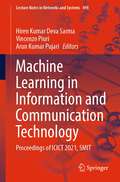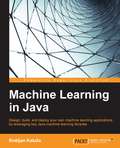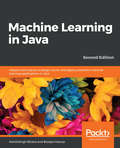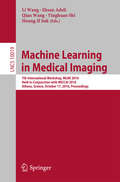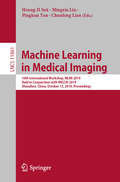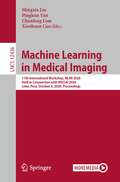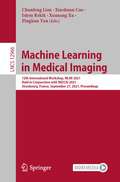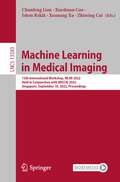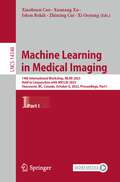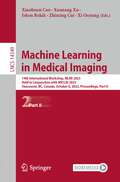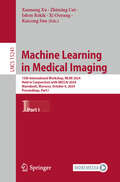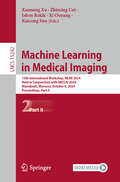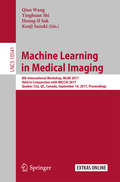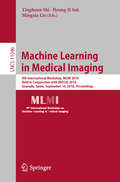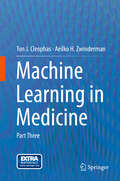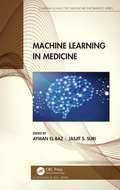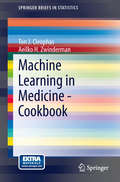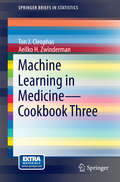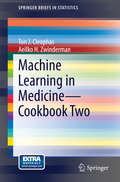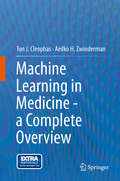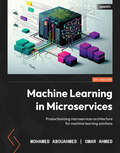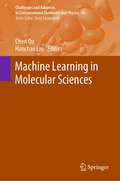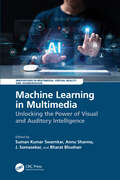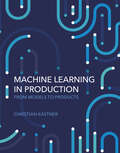- Table View
- List View
Machine Learning in Information and Communication Technology: Proceedings of ICICT 2021, SMIT (Lecture Notes in Networks and Systems #498)
by Vincenzo Piuri Hiren Kumar Deva Sarma Arun Kumar PujariThis book presents collection of research papers presented at International Conference on Information and Communication Technology (ICICT 2021) organized by Department of Information Technology, Sikkim Manipal Institute of Technology, Sikkim, India, during 23–24 December 2021. The book includes papers in the research area of communication networks, data science, healthcare informatics, bio-medical image processing, security of information including cryptography, machine learning applications, and AI applications.
Machine Learning in Java
by Bostjan KaluzaDesign, build, and deploy your own machine learning applications by leveraging key Java machine learning libraries About This Book * Develop a sound strategy to solve predictive modelling problems using the most popular machine learning Java libraries * Explore a broad variety of data processing, machine learning, and natural language processing through diagrams, source code, and real-world applications * Packed with practical advice and tips to help you get to grips with applied machine learning Who This Book Is For If you want to learn how to use Java's machine learning libraries to gain insight from your data, this book is for you. It will get you up and running quickly and provide you with the skills you need to successfully create, customize, and deploy machine learning applications in real life. You should be familiar with Java programming and data mining concepts to make the most of this book, but no prior experience with data mining packages is necessary. What You Will Learn * Understand the basic steps of applied machine learning and how to differentiate among various machine learning approaches * Discover key Java machine learning libraries, what each library brings to the table, and what kind of problems each are able to solve * Learn how to implement classification, regression, and clustering * Develop a sustainable strategy for customer retention by predicting likely churn candidates * Build a scalable recommendation engine with Apache Mahout * Apply machine learning to fraud, anomaly, and outlier detection * Experiment with deep learning concepts, algorithms, and the toolbox for deep learning * Write your own activity recognition model for eHealth applications using mobile sensors In Detail As the amount of data continues to grow at an almost incomprehensible rate, being able to understand and process data is becoming a key differentiator for competitive organizations. Machine learning applications are everywhere, from self-driving cars, spam detection, document search, and trading strategies, to speech recognition. This makes machine learning well-suited to the present-day era of Big Data and Data Science. The main challenge is how to transform data into actionable knowledge. Machine Learning in Java will provide you with the techniques and tools you need to quickly gain insight from complex data. You will start by learning how to apply machine learning methods to a variety of common tasks including classification, prediction, forecasting, market basket analysis, and clustering. Moving on, you will discover how to detect anomalies and fraud, and ways to perform activity recognition, image recognition, and text analysis. By the end of the book, you will explore related web resources and technologies that will help you take your learning to the next level. By applying the most effective machine learning methods to real-world problems, you will gain hands-on experience that will transform the way you think about data. Style and approach This is a practical tutorial that uses hands-on examples to step through some real-world applications of machine learning. Without shying away from the technical details, you will explore machine learning with Java libraries using clear and practical examples. You will explore how to prepare data for analysis, choose a machine learning method, and measure the success of the process.
Machine Learning in Java: Helpful techniques to design, build, and deploy powerful machine learning applications in Java, 2nd Edition
by Bostjan Kaluza AshishSingh BhatiaLeverage the power of Java and its associated machine learning libraries to build powerful predictive models Key Features *Solve predictive modeling problems using the most popular machine learning Java libraries *Explore data processing, machine learning, and NLP concepts using JavaML, WEKA, MALLET libraries *Practical examples, tips, and tricks to help you understand applied machine learning in Java Book Description As the amount of data in the world continues to grow at an almost incomprehensible rate, being able to understand and process data is becoming a key differentiator for competitive organizations. Machine learning applications are everywhere, from self-driving cars, spam detection, document search, and trading strategies, to speech recognition. This makes machine learning well-suited to the present-day era of big data and Data Science. The main challenge is how to transform data into actionable knowledge. Machine Learning in Java will provide you with the techniques and tools you need. You will start by learning how to apply machine learning methods to a variety of common tasks including classification, prediction, forecasting, market basket analysis, and clustering. The code in this book works for JDK 8 and above, the code is tested on JDK 11. Moving on, you will discover how to detect anomalies and fraud, and ways to perform activity recognition, image recognition, and text analysis. By the end of the book, you will have explored related web resources and technologies that will help you take your learning to the next level. By applying the most effective machine learning methods to real-world problems, you will gain hands-on experience that will transform the way you think about data. What you will learn *Discover key Java machine learning libraries *Implement concepts such as classification, regression, and clustering *Develop a customer retention strategy by predicting likely churn candidates *Build a scalable recommendation engine with Apache Mahout *Apply machine learning to fraud, anomaly, and outlier detection *Experiment with deep learning concepts and algorithms *Write your own activity recognition model for eHealth applications Who this book is for If you want to learn how to use Java's machine learning libraries to gain insight from your data, this book is for you. It will get you up and running quickly and provide you with the skills you need to successfully create, customize, and deploy machine learning applications with ease. You should be familiar with Java programming and some basic data mining concepts to make the most of this book, but no prior experience with machine learning is required.
Machine Learning in Medical Imaging
by Qian Wang Li Wang Ehsan Adeli Yinghuan Shi Heung-Il SukThis book constitutes the refereed proceedings of the 7th International Workshop on Machine Learning in Medical Imaging, MLMI 2016, held in conjunction with MICCAI 2016, in Athens, Greece, in October 2016. The 38 full papers presented in this volume were carefully reviewed and selected from 60 submissions. The main aim of this workshop is to help advance scientific research within the broad field of machine learning in medical imaging. The workshop focuses on major trends and challenges in this area, and presents works aimed to identify new cutting-edge techniques and their use in medical imaging.
Machine Learning in Medical Imaging: 10th International Workshop, MLMI 2019, Held in Conjunction with MICCAI 2019, Shenzhen, China, October 13, 2019, Proceedings (Lecture Notes in Computer Science #11861)
by Heung-Il Suk Mingxia Liu Pingkun Yan Chunfeng LianThis book constitutes the proceedings of the 10th International Workshop on Machine Learning in Medical Imaging, MLMI 2019, held in conjunction with MICCAI 2019, in Shenzhen, China, in October 2019. The 78 papers presented in this volume were carefully reviewed and selected from 158 submissions. They focus on major trends and challenges in the area, aiming to identify new-cutting-edge techniques and their uses in medical imaging. Topics dealt with are: deep learning, generative adversarial learning, ensemble learning, sparse learning, multi-task learning, multi-view learning, manifold learning, and reinforcement learning, with their applications to medical image analysis, computer-aided detection and diagnosis, multi-modality fusion, image reconstruction, image retrieval, cellular image analysis, molecular imaging, digital pathology, etc.
Machine Learning in Medical Imaging: 11th International Workshop, MLMI 2020, Held in Conjunction with MICCAI 2020, Lima, Peru, October 4, 2020, Proceedings (Lecture Notes in Computer Science #12436)
by Mingxia Liu Pingkun Yan Chunfeng Lian Xiaohuan CaoThis book constitutes the proceedings of the 11th International Workshop on Machine Learning in Medical Imaging, MLMI 2020, held in conjunction with MICCAI 2020, in Lima, Peru, in October 2020. The conference was held virtually due to the COVID-19 pandemic. The 68 papers presented in this volume were carefully reviewed and selected from 101 submissions. They focus on major trends and challenges in the above-mentioned area, aiming to identify new-cutting-edge techniques and their uses in medical imaging. Topics dealt with are: deep learning, generative adversarial learning, ensemble learning, sparse learning, multi-task learning, multi-view learning, manifold learning, and reinforcement learning, with their applications to medical image analysis, computer-aided detection and diagnosis, multi-modality fusion, image reconstruction, image retrieval, cellular image analysis, molecular imaging, digital pathology, etc.
Machine Learning in Medical Imaging: 12th International Workshop, MLMI 2021, Held in Conjunction with MICCAI 2021, Strasbourg, France, September 27, 2021, Proceedings (Lecture Notes in Computer Science #12966)
by Islem Rekik Pingkun Yan Chunfeng Lian Xiaohuan Cao Xuanang XuThis book constitutes the proceedings of the 12th International Workshop on Machine Learning in Medical Imaging, MLMI 2021, held in conjunction with MICCAI 2021, in Strasbourg, France, in September 2021.*The 71 papers presented in this volume were carefully reviewed and selected from 92 submissions. They focus on major trends and challenges in the above-mentioned area, aiming to identify new-cutting-edge techniques and their uses in medical imaging. Topics dealt with are: deep learning, generative adversarial learning, ensemble learning, sparse learning, multi-task learning, multi-view learning, manifold learning, and reinforcement learning, with their applications to medical image analysis, computer-aided detection and diagnosis, multi-modality fusion, image reconstruction, image retrieval, cellular image analysis, molecular imaging, digital pathology, etc. *The workshop was held virtually.
Machine Learning in Medical Imaging: 13th International Workshop, MLMI 2022, Held in Conjunction with MICCAI 2022, Singapore, September 18, 2022, Proceedings (Lecture Notes in Computer Science #13583)
by Islem Rekik Chunfeng Lian Xiaohuan Cao Xuanang Xu Zhiming CuiThis book constitutes the proceedings of the 13th International Workshop on Machine Learning in Medical Imaging, MLMI 2022, held in conjunction with MICCAI 2022, in Singapore, in September 2022. The 48 full papers presented in this volume were carefully reviewed and selected from 64 submissions. They focus on major trends and challenges in the above-mentioned area, aiming to identify new-cutting-edge techniques and their uses in medical imaging. Topics dealt with are: deep learning, generative adversarial learning, ensemble learning, sparse learning, multi-task learning, multi-view learning, manifold learning, and reinforcement learning, with their applications to medical image analysis, computer-aided detection and diagnosis, multi-modality fusion, image reconstruction, image retrieval, cellular image analysis, molecular imaging, digital pathology, etc.
Machine Learning in Medical Imaging: 14th International Workshop, MLMI 2023, Held in Conjunction with MICCAI 2023, Vancouver, BC, Canada, October 8, 2023, Proceedings, Part I (Lecture Notes in Computer Science #14348)
by Islem Rekik Xiaohuan Cao Xuanang Xu Zhiming Cui Xi OuyangThe two-volume set LNCS 14348 and 14139 constitutes the proceedings of the 14th International Workshop on Machine Learning in Medical Imaging, MLMI 2023, held in conjunction with MICCAI 2023, in Vancouver, Canada, in October 2023. The 93 full papers presented in the proceedings were carefully reviewed and selected from 139 submissions. They focus on major trends and challenges in artificial intelligence and machine learning in the medical imaging field, translating medical imaging research into clinical practice. Topics of interests included deep learning, generative adversarial learning, ensemble learning, transfer learning, multi-task learning, manifold learning, reinforcement learning, along with their applications to medical image analysis, computer-aided diagnosis, multi-modality fusion, image reconstruction, image retrieval, cellular image analysis, molecular imaging, digital pathology, etc.
Machine Learning in Medical Imaging: 14th International Workshop, MLMI 2023, Held in Conjunction with MICCAI 2023, Vancouver, BC, Canada, October 8, 2023, Proceedings, Part II (Lecture Notes in Computer Science #14349)
by Islem Rekik Xiaohuan Cao Xuanang Xu Zhiming Cui Xi OuyangThe two-volume set LNCS 14348 and 14139 constitutes the proceedings of the 14th International Workshop on Machine Learning in Medical Imaging, MLMI 2023, held in conjunction with MICCAI 2023, in Vancouver, Canada, in October 2023. The 93 full papers presented in the proceedings were carefully reviewed and selected from 139 submissions. They focus on major trends and challenges in artificial intelligence and machine learning in the medical imaging field, translating medical imaging research into clinical practice. Topics of interests included deep learning, generative adversarial learning, ensemble learning, transfer learning, multi-task learning, manifold learning, reinforcement learning, along with their applications to medical image analysis, computer-aided diagnosis, multi-modality fusion, image reconstruction, image retrieval, cellular image analysis, molecular imaging, digital pathology, etc.
Machine Learning in Medical Imaging: 15th International Workshop, MLMI 2024, Held in Conjunction with MICCAI 2024, Marrakesh, Morocco, October 6, 2024, Proceedings, Part I (Lecture Notes in Computer Science #15241)
by Islem Rekik Xuanang Xu Zhiming Cui Xi Ouyang Kaicong SunThis book constitutes the proceedings of the 15th International Workshop on Machine Learning in Medical Imaging, MLMI 2023, held in conjunction with MICCAI 2024, Marrakesh, Morocco, on October 6, 2024. The 63 full papers presented in this volume were carefully reviewed and selected from 100 submissions. They focus on major trends and challenges in the above-mentioned area, aiming to identify new-cutting-edge techniques and their uses in medical imaging using artificial intelligence (AI) and machine learning (ML).
Machine Learning in Medical Imaging: 15th International Workshop, MLMI 2024, Held in Conjunction with MICCAI 2024, Marrakesh, Morocco, October 6, 2024, Proceedings, Part II (Lecture Notes in Computer Science #15242)
by Islem Rekik Xuanang Xu Zhiming Cui Xi Ouyang Kaicong SunThis book constitutes the proceedings of the 15th International Workshop on Machine Learning in Medical Imaging, MLMI 2024, held in conjunction with MICCAI 2024, Marrakesh, Morocco, on October 6, 2024. The 63 full papers presented in this volume were carefully reviewed and selected from 100 submissions. They focus on major trends and challenges in the above-mentioned area, aiming to identify new-cutting-edge techniques and their uses in medical imaging using artificial intelligence (AI) and machine learning (ML).
Machine Learning in Medical Imaging: 7th International Workshop, MLMI 2016, Held in Conjunction with MICCAI 2016, Athens, Greece, October 17, 2016, Proceedings (Lecture Notes in Computer Science #10019)
by Li Wang, Ehsan Adeli, Qian Wang, Yinghuan Shi and Heung-Il SukThis book constitutes the refereed proceedings of the 7th International Workshop on Machine Learning in Medical Imaging, MLMI 2016, held in conjunction with MICCAI 2016, in Athens, Greece, in October 2016. The 38 full papers presented in this volume were carefully reviewed and selected from 60 submissions. The main aim of this workshop is to help advance scientific research within the broad field of machine learning in medical imaging. The workshop focuses on major trends and challenges in this area, and presents works aimed to identify new cutting-edge techniques and their use in medical imaging.
Machine Learning in Medical Imaging: 8th International Workshop, MLMI 2017, Held in Conjunction with MICCAI 2017, Quebec City, QC, Canada, September 10, 2017, Proceedings (Lecture Notes in Computer Science #10541)
by Qian Wang, Yinghuan Shi, Heung-Il Suk and Kenji SuzukiThis book constitutes the refereed proceedings of the 8th International Workshop on Machine Learning in Medical Imaging, MLMI 2017, held in conjunction with MICCAI 2017, in Quebec City, QC, Canada, in September 2017. The 44 full papers presented in this volume were carefully reviewed and selected from 63 submissions. The main aim of this workshop is to help advance scientific research within the broad field of machine learning in medical imaging. The workshop focuses on major trends and challenges in this area, and presents works aimed to identify new cutting-edge techniques and their use in medical imaging.
Machine Learning in Medical Imaging: 9th International Workshop, MLMI 2018, Held in Conjunction with MICCAI 2018, Granada, Spain, September 16, 2018, Proceedings (Lecture Notes in Computer Science #11046)
by Yinghuan Shi Heung-Il Suk Mingxia LiuThis book constitutes the proceedings of the 9th International Workshop on Machine Learning in Medical Imaging, MLMI 2018, held in conjunction with MICCAI 2018 in Granada, Spain, in September 2018.The 45 papers presented in this volume were carefully reviewed and selected from 82 submissions. They focus on major trends and challenges in the area of machine learning in medical imaging and aim to identify new cutting-edge techniques and their use in medical imaging.
Machine Learning in Medicine
by Aeilko H. Zwinderman Ton J. CleophasMachine learning is a novel discipline concerned with the analysis of large and multiple variables data. It involves computationally intensive methods, like factor analysis, cluster analysis, and discriminant analysis. It is currently mainly the domain of computer scientists, and is already commonly used in social sciences, marketing research, operational research and applied sciences. It is virtually unused in clinical research. This is probably due to the traditional belief of clinicians in clinical trials where multiple variables are equally balanced by the randomization process and are not further taken into account. In contrast, modern computer data files often involve hundreds of variables like genes and other laboratory values, and computationally intensive methods are required. This book was written as a hand-hold presentation accessible to clinicians, and as a must-read publication for those new to the methods.
Machine Learning in Medicine (Chapman & Hall/CRC Healthcare Informatics Series)
by Jasjit S. Suri Ayman El-BazMachine Learning in Medicine covers the state-of-the-art techniques of machine learning and their applications in the medical field. It presents several computer-aided diagnosis (CAD) systems, which have played an important role in the diagnosis of several diseases in the past decade, e.g., cancer detection, resulting in the development of several successful systems. New developments in machine learning may make it possible in the near future to develop machines that are capable of completely performing tasks that currently cannot be completed without human aid, especially in the medical field. This book covers such machines, including convolutional neural networks (CNNs) with different activation functions for small- to medium-size biomedical datasets, detection of abnormal activities stemming from cognitive decline, thermal dose modelling for thermal ablative cancer treatments, dermatological machine learning clinical decision support systems, artificial intelligence-powered ultrasound for diagnosis, practical challenges with possible solutions for machine learning in medical imaging, epilepsy diagnosis from structural MRI, Alzheimer's disease diagnosis, classification of left ventricular hypertrophy, and intelligent medical language understanding. This book will help to advance scientific research within the broad field of machine learning in the medical field. It focuses on major trends and challenges in this area and presents work aimed at identifying new techniques and their use in biomedical analysis, including extensive references at the end of each chapter.
Machine Learning in Medicine - Cookbook
by Aeilko H. Zwinderman Ton J. CleophasThe amount of data in medical databases doubles every 20 months, and physicians are at a loss to analyze them. Also, traditional methods of data analysis have difficulty to identify outliers and patterns in big data and data with multiple exposure / outcome variables and analysis-rules for surveys and questionnaires, currently common methods of data collection, are, essentially, missing. Obviously, it is time that medical and health professionals mastered their reluctance to use machine learning and the current 100 page cookbook should be helpful to that aim. It covers in a condensed form the subjects reviewed in the 750 page three volume textbook by the same authors, entitled "Machine Learning in Medicine I-III" (ed. by Springer, Heidelberg, Germany, 2013) and was written as a hand-hold presentation and must-read publication. It was written not only to investigators and students in the fields, but also to jaded clinicians new to the methods and lacking time to read the entire textbooks. General purposes and scientific questions of the methods are only briefly mentioned, but full attention is given to the technical details. The two authors, a statistician and current president of the International Association of Biostatistics and a clinician and past-president of the American College of Angiology, provide plenty of step-by-step analyses from their own research and data files for self-assessment are available at extras. springer. com. From their experience the authors demonstrate that machine learning performs sometimes better than traditional statistics does. Machine learning may have little options for adjusting confounding and interaction, but you can add propensity scores and interaction variables to almost any machine learning method.
Machine Learning in Medicine - Cookbook Three
by Aeilko H. Zwinderman Ton J. CleophasUnique features of the book involve the following. 1. This book is the third volume of a three volume series of cookbooks entitled "Machine Learning in Medicine - Cookbooks One, Two, and Three". No other self-assessment works for the medical and health care community covering the field of machine learning have been published to date. 2. Each chapter of the book can be studied without the need to consult other chapters, and can, for the readership''s convenience, be downloaded from the internet. Self-assessment examples are available at extras. springer. com. 3. An adequate command of machine learning methodologies is a requirement for physicians and other health workers, particularly now, because the amount of medical computer data files currently doubles every 20 months, and, because, soon, it will be impossible for them to take proper data-based health decisions without the help of machine learning. 4. Given the importance of knowledge of machine learning in the medical and health care community, and the current lack of knowledge of it, the readership will consist of any physician and health worker. 5. The book was written in a simple language in order to enhance readability not only for the advanced but also for the novices. 6. The book is multipurpose, it is an introduction for ignorant, a primer for the inexperienced, and a self-assessment handbook for the advanced. 7. The book, was, particularly, written for jaded physicians and any other health care professionals lacking time to read the entire series of three textbooks. 8. Like the other two cookbooks it contains technical descriptions and self-assessment examples of 20 important computer methodologies for medical data analysis, and it, largely, skips the theoretical and mathematical background. 9. Information of theoretical and mathematical background of the methods described are displayed in a "notes" section at the end of each chapter. 10. Unlike traditional statistical methods, the machine learning methodologies are able to analyze big data including thousands of cases and hundreds of variables. 11. The medical and health care community is little aware of the multidimensional nature of current medical data files, and experimental clinical studies are not helpful to that aim either, because these studies, usually, assume that subgroup characteristics are unimportant, as long as the study is randomized. This is, of course, untrue, because any subgroup characteristic may be vital to an individual at risk. 12. To date, except for a three volume introductary series on the subject entitled "Machine Learning in Medicine Part One, Two, and Thee, 2013, Springer Heidelberg Germany" from the same authors, and the current cookbook series, no books on machine learning in medicine have been published. 13. Another unique feature of the cookbooks is that it was jointly written by two authors from different disciplines, one being a clinician/clinical pharmacologist, one being a mathematician/biostatistician. 14. The authors have also jointly been teaching at universities and institutions throughout Europe and the USA for the past 20 years. 15. The authors have managed to cover the field of medical data analysis in a nonmathematical way for the benefit of medical and health workers. 16. The authors already successfully published many statistics textbooks and self-assessment books, e. g. , the 67 chapter textbook entitled "Statistics Applied to Clinical Studies 5th Edition, 2012, Springer Heidelberg Germany" with downloads of 62,826 copies. 17. The current cookbook makes use, in addition to SPSS statistical software, of various free calculators from the internet, as well as the Konstanz Information Miner (Knime), a widely approved free machine learning package, and the free Weka Data Mining package from New Zealand. 18. The above software packages with hundreds of nodes, the basic processing units including virtually all of the statistical and data mining methods, can be used not only for data analyses, but also for appropriate data stora...
Machine Learning in Medicine - Cookbook Two
by Aeilko H. Zwinderman Ton J. CleophasThe amount of data medical databases doubles every 20 months, and physicians are at a loss to analyze them. Also, traditional data analysis has difficulty to identify outliers and patterns in big data and data with multiple exposure / outcome variables and analysis-rules for surveys and questionnaires, currently common methods of data collection, are, essentially, missing. Consequently, proper data-based health decisions will soon be impossible. Obviously, it is time that medical and health professionals mastered their reluctance to use machine learning methods and this was the main incentive for the authors to complete a series of three textbooks entitled "Machine Learning in Medicine Part One, Two and Three, Springer Heidelberg Germany, 2012-2013", describing in a nonmathematical way over sixty machine learning methodologies, as available in SPSS statistical software and other major software programs. Although well received, it came to our attention that physicians and students often lacked time to read the entire books, and requested a small book, without background information and theoretical discussions and highlighting technical details. For this reason we produced a 100 page cookbook, entitled "Machine Learning in Medicine - Cookbook One", with data examples available at extras. springer. com for self-assessment and with reference to the above textbooks for background information. Already at the completion of this cookbook we came to realize, that many essential methods were not covered. The current volume, entitled "Machine Learning in Medicine - Cookbook Two" is complementary to the first and also intended for providing a more balanced view of the field and thus, as a must-read not only for physicians and students, but also for any one involved in the process and progress of health and health care. Similarly to Machine Learning in Medicine - Cookbook One, the current work will describe stepwise analyses of over twenty machine learning methods, that are, likewise, based on the three major machine learning methodologies: Cluster methodologies (Chaps. 1-3) Linear methodologies (Chaps. 4-11) Rules methodologies (Chaps. 12-20) In extras. springer. com the data files of the examples are given, as well as XML (Extended Mark up Language), SPS (Syntax) and ZIP (compressed) files for outcome predictions in future patients. In addition to condensed versions of the methods, fully described in the above three textbooks, an introduction is given to SPSS Modeler (SPSS' data mining workbench) in the Chaps. 15, 18, 19, while improved statistical methods like various automated analyses and Monte Carlo simulation models are in the Chaps. 1, 5, 7 and 8. We should emphasize that all of the methods described have been successfully applied in practice by the authors, both of them professors in applied statistics and machine learning at the European Community College of Pharmaceutical Medicine in Lyon France. We recommend the current work not only as a training companion to investigators and students, because of plenty of step by step analyses given, but also as a brief introductory text to jaded clinicians new to the methods. For the latter purpose, background and theoretical information have been replaced with the appropriate references to the above textbooks, while single sections addressing "general purposes", "main scientific questions" and "conclusions" are given in place. Finally, we will demonstrate that modern machine learning performs sometimes better than traditional statistics does. Machine learning may have little options for adjusting confounding and interaction, but you can add propensity scores and interaction variables to almost any machine learning method.
Machine Learning in Medicine - a Complete Overview
by Aeilko H. Zwinderman Ton J. CleophasThe current book is the first publication of a complete overview of machine learning methodologies for the medical and health sector. It was written as a training companion and as a must-read, not only for physicians and students, but also for any one involved in the process and progress of health and health care. In eighty chapters eighty different machine learning methodologies are reviewed, in combination with data examples for self-assessment. Each chapter can be studied without the need to consult other chapters. The amount of data stored in the world's databases doubles every 20 months, and clinicians, familiar with traditional statistical methods, are at a loss to analyze them. Traditional methods have, indeed, difficulty to identify outliers in large datasets, and to find patterns in big data and data with multiple exposure / outcome variables. In addition, analysis-rules for surveys and questionnaires, which are currently common methods of data collection, are, essentially, missing. Fortunately, the new discipline, machine learning, is able to cover all of these limitations. So far medical professionals have been rather reluctant to use machine learning. Also, in the field of diagnosis making, few doctors may want a computer checking them, are interested in collaboration with a computer or with computer engineers. Adequate health and health care will, however, soon be impossible without proper data supervision from modern machine learning methodologies like cluster models, neural networks and other data mining methodologies. Each chapter starts with purposes and scientific questions. Then, step-by-step analyses, using data examples, are given. Finally, a paragraph with conclusion, and references to the corresponding sites of three introductory textbooks, previously written by the same authors, is given.
Machine Learning in Microservices: Productionizing microservices architecture for machine learning solutions
by Omar Ahmed Mohamed AbouahmedImplement real-world machine learning in a microservices architecture as well as design, build, and deploy intelligent microservices systems using examples and case studiesPurchase of the print or Kindle book includes a free PDF eBookKey FeaturesDesign, build, and run microservices systems that utilize the full potential of machine learningDiscover the latest models and techniques for combining microservices and machine learning to create scalable systemsImplement machine learning in microservices architecture using open source applications with pros and consBook DescriptionWith the rising need for agile development and very short time-to-market system deployments, incorporating machine learning algorithms into decoupled fine-grained microservices systems provides the perfect technology mix for modern systems. Machine Learning in Microservices is your essential guide to staying ahead of the curve in this ever-evolving world of technology.The book starts by introducing you to the concept of machine learning microservices architecture (MSA) and comparing MSA with service-based and event-driven architectures, along with how to transition into MSA. Next, you'll learn about the different approaches to building MSA and find out how to overcome common practical challenges faced in MSA design. As you advance, you'll get to grips with machine learning (ML) concepts and see how they can help better design and run MSA systems. Finally, the book will take you through practical examples and open source applications that will help you build and run highly efficient, agile microservices systems.By the end of this microservices book, you'll have a clear idea of different models of microservices architecture and machine learning and be able to combine both technologies to deliver a flexible and highly scalable enterprise system.What you will learnRecognize the importance of MSA and ML and deploy both technologies in enterprise systemsExplore MSA enterprise systems and their general practical challengesDiscover how to design and develop microservices architectureUnderstand the different AI algorithms, types, and models and how they can be applied to MSAIdentify and overcome common MSA deployment challenges using AI and ML algorithmsExplore general open source and commercial tools commonly used in MSA enterprise systemsWho this book is forThis book is for machine learning solution architects, system and machine learning developers, and system and solution integrators of private and public sector organizations. Basic knowledge of DevOps, system architecture, and artificial intelligence (AI) systems is assumed, and working knowledge of the Python programming language is highly desired.
Machine Learning in Molecular Sciences (Challenges and Advances in Computational Chemistry and Physics #36)
by Chen Qu Hanchao LiuMachine learning and artificial intelligence have propelled research across various molecular science disciplines thanks to the rapid progress in computing hardware, algorithms, and data accumulation. This book presents recent machine learning applications in the broad research field of molecular sciences. Written by an international group of renowned experts, this edited volume covers both the machine learning methodologies and state-of-the-art machine learning applications in a wide range of topics in molecular sciences, from electronic structure theory to nuclear dynamics of small molecules, to the design and synthesis of large organic and biological molecules. This book is a valuable resource for researchers and students interested in applying machine learning in the research of molecular sciences.
Machine Learning in Multimedia: Unlocking the Power of Visual and Auditory Intelligence (Innovations in Multimedia, Virtual Reality and Augmentation)
by Bharat Bhushan Suman Kumar Swarnkar Annu Sharma J. SomasekarThis book explores the interdisciplinary nature of machine learning in multimedia, highlighting its intersections with fields such as computer vision, natural language processing, and audio signal processing.Machine Learning in Multimedia: Unlocking the Power of Visual and Auditory Intelligence serves as a comprehensive guide to navigating this exciting terrain where artificial intelligence meets the rich tapestry of visual and auditory data. At its core, this book seeks to unravel the mysteries and unveil the potential of machine learning in the realm of multimedia. Whether it's enhancing user experiences in virtual environments, revolutionizing medical diagnostics, or shaping the future of entertainment, the impact of machine learning in multimedia is profound and far-reaching. The journey begins with a thorough exploration of the foundational principles of machine learning, providing readers with a solid understanding of algorithms, models, and techniques tailored specifically for multimedia data. Through clear explanations and illustrative examples, readers will gain insights into how machine learning algorithms can be trained to extract meaningful patterns and insights from diverse forms of multimedia content. Moving beyond theory, this book delves into practical implementations and real-world applications of machine learning in multimedia. Through a series of case studies and examples, readers will witness firsthand how machine learning algorithms are transforming industries and reshaping the way we interact with multimedia content. Whether it's improving image recognition accuracy in autonomous vehicles, enabling personalized recommendations in streaming platforms, or enhancing speech recognition systems for better accessibility, the possibilities are limitless.This book will be helpful to computer science, data science, and artificial intelligence researchers, students, and professionals looking to unlock the full potential of visual and auditory intelligence through the power of machine learning.
Machine Learning in Production: From Models to Products
by Christian KastnerA practical and innovative textbook detailing how to build real-world software products with machine learning components, not just models.Traditional machine learning texts focus on how to train and evaluate the machine learning model, while MLOps books focus on how to streamline model development and deployment. But neither focus on how to build actual products that deliver value to users. This practical textbook, by contrast, details how to responsibly build products with machine learning components, covering the entire development lifecycle from requirements and design to quality assurance and operations. Machine Learning in Production brings an engineering mindset to the challenge of building systems that are usable, reliable, scalable, and safe within the context of real-world conditions of uncertainty, incomplete information, and resource constraints. Based on the author’s popular class at Carnegie Mellon, this pioneering book integrates foundational knowledge in software engineering and machine learning to provide the holistic view needed to create not only prototype models but production-ready systems. • Integrates coverage of cutting-edge research, existing tools, and real-world applications• Provides students and professionals with an engineering view for production-ready machine learning systems• Proven in the classroom• Offers supplemental resources including slides, videos, exams, and further readings
